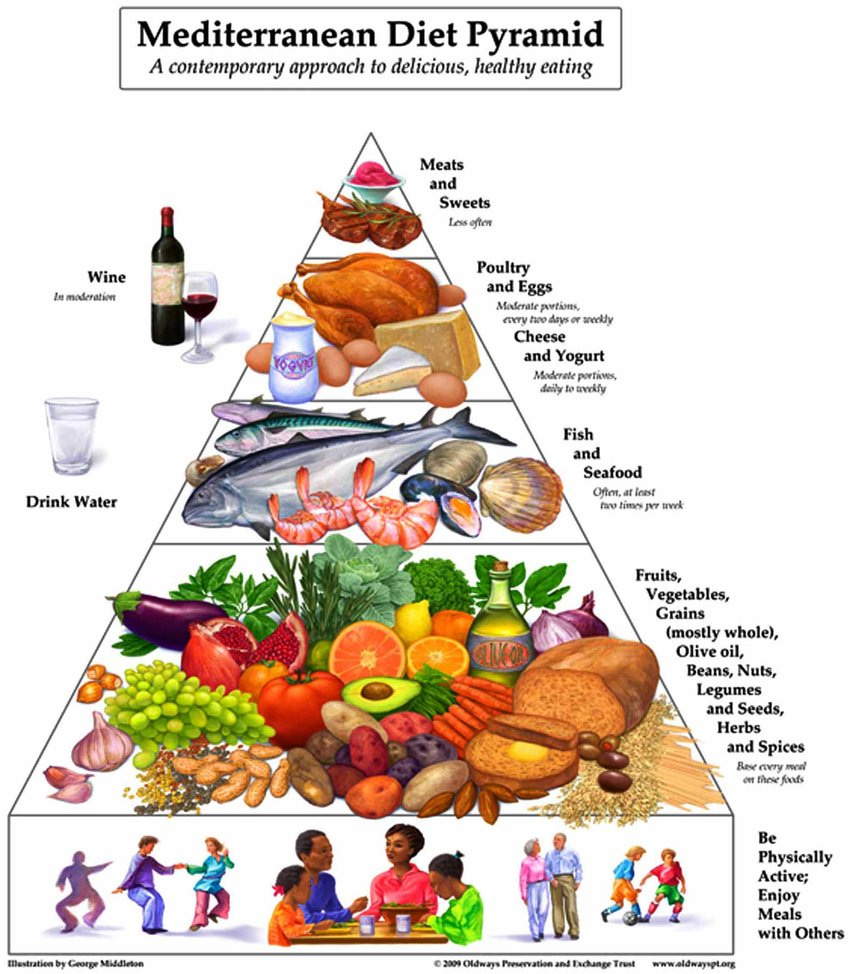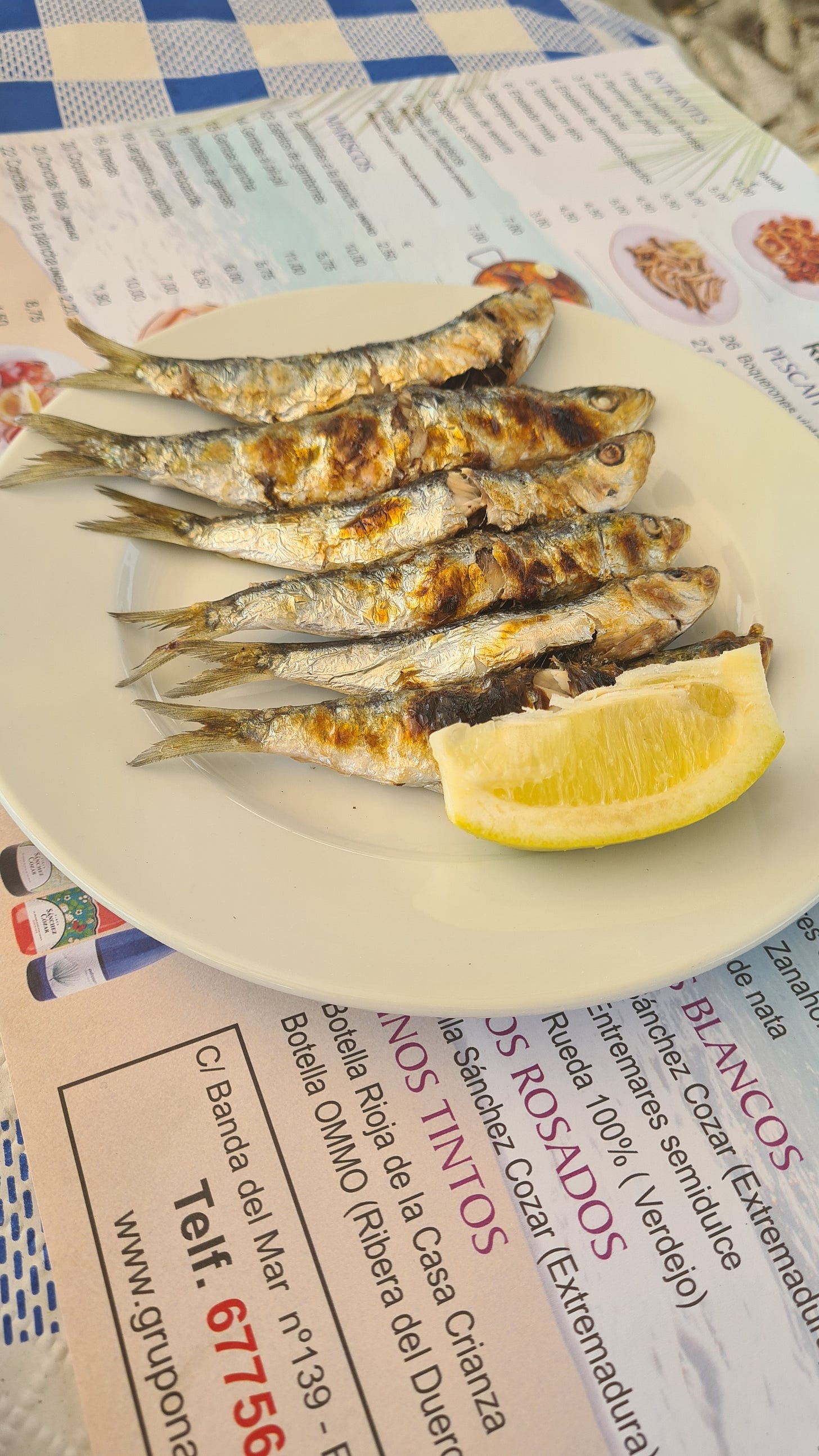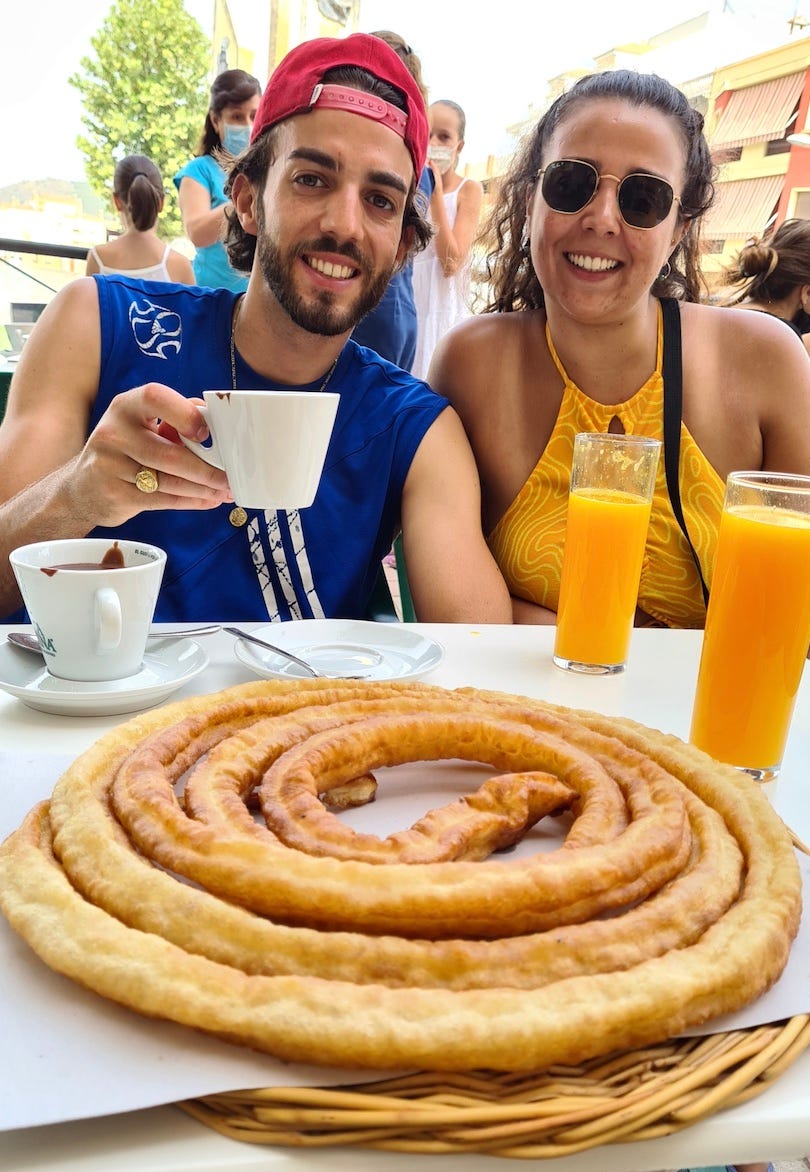How to make your 'diet' more Mediterranean - Live from Andalucía, Spain 🇪🇸
How to adapt your lifestyle to live a healthier more disease free life including an update regarding upcoming projects.
¡Hola!
Good evening valued subscribers.
As I am writing this newsletter, I have a great view of the Mediterranean Sea in a place called, Baños del Carmen in the suburbs of Malaga, Andalucia. Haris and I have both recently finished our two-year junior doctors contracts within the NHS Northern Deanery in the UK. We are now enjoying some down-time. The experience has been incredibly exciting, at points challenging (tears may have been shed 😰) but in particular very rewarding with regards to the ongoing pandemic. The last two years has shown us the horrendous consequences that our life choices can have on our ability to fight off disease. This study shows that increasing BMI and obesity may triple the risk of hospitalization due to a COVID-19 infection.
North Tees and Hartlepool Hospital, where I completed my Foundation Doctor Training 2019 - 2021.
Why the Mediterranean Diet?
US News and World Report has ranked the Mediterranean Diet as the best overall diet in the annual best diet rankings for a 4th consecutive year. The diet also ranked as No1 in five other categories: best diets for health eating, easiest diet to follow, best diet for diabetes, best heart-healthy diet and best plant-based diet. For reference, the DASH diet (Dietary Approach to Stop Hypertension) and the Flexitarian diet tied for No. 2 in the best diet overall and best diabetes diet categories.
Typical foods which are consumed when adhering to the Mediterranean diet.
The Mediterranean Lifestyle rather than Diet?
The Mediterranean diet can be considered a way of life rather than simply a fad diet. Within Italian, Greek and Spanish culture (other Mediterranean countries are available) no food is restricted or banned and there is no such thing as calorie counting. The emphasis here is on daily practice, a sustainable way of living or put simply, moderation. The key principles of the Mediterranean lifestyle are as follows:
1) Physical Activity - be as physically active as possible. This does not need to come from 2 hours of heavy weight training at the gym. Roughly 11.4% of the Spanish population have a gym membership (European Health and Fitness Report 2019) while 13.3% of people are classed as obese. Roughly 13.7% of the British population have a gym membership (UK Active) while 28% are obese. Admittedly the weather plays a part in swinging these statistics in favour of the Spanish.
Free Outdoor Exercise Facility in Baños del Carmen, Malaga.
2) Enjoy meals with others. The majority of mediterranean people enjoy their evening meal with family or friends. It is very rare to eat a meal in front of the television. The distraction of the television confuses our bodies hunger and fullness signals which can contribute to binge eating.
The Food List and Tips to Improve your Diet
Below is a handy pyramid describing the type of foods and frequency of ingestion of the different food types.
Eat MORE (every day), fruits, whole grains, beans, nuts, seeds and legumes.
Fruits and vegetable are high in fibre. High fibre intake has been shown to reduce belly fat and promote weight loss (1. Soluble fibres combine with water in our stomachs to form a gel like substance. This slows down how fast our stomach can release food into the small intestines. This suppresses appetite and makes us feel fuller for longer.Replace your refined carbohydrate snacks such as cookies, chips, cereal bars with real ‘whole grains’. Whole grains refer to the entire seed rather than grains which have been ‘milled’ which removes fibre containing components such as bran. Things like Quinoa, Oatmeal and unsweetened Popcorn are examples of this.
Eat MODERATELY (weekly) lean protein sources from fish, some poultry, and eggs.
The go-to protein in the Mediterranean diet is fish. In particular, this diet emphasizes fatty fish like salmon, sardines and mackerel. These fish contain heart and brain healthy sources of Omega 3 fatty acid which reduce inflammation to our organs. Lean meats such are chicken and turkey are also consumed in moderation.Espeto de Sardinas - Skewered BBQ Sardines - A staple tapas dish here in Malaga, Spain.
Eat LESS red Meats and Sweets. Red meat (beef and lamb) is consumed less frequently and also in smaller amounts.
The emphasis here is to reduce the amount of saturated (bad) fats which are present in rich, red meats. Sources of unsaturated (good) fats include: fish as described above, avocados, olives, peanut butter and nuts and seeds.Use Extra Virgin Olive oil regularly.
Extra virgin olive oil is the least refined type of oil and lowers level of bad LDL cholesterol. Each tablespoon of extra virgin olive oil has about 1.9 mg of Vitamin E, a fat-soluble anti-oxidant that protects against eye and skin problems and in fact make hair and skin much healthier. No wonder, the Mediterranean people have such glowing skin and luscious locks! Extra Virgin Olive Oil protects the body from diabetes, neurological disease and lung cancer (2).Drink Red Wine in moderation.
Replace sugar laden margaritas or carbohydrate heavy beers with good quality Vino Tinto (red wine). Red wine is antioxidant heavy, lowers blood pressure and protects our heart from atherosclerosis (changes associated with heart disease).Avoid processed foods
Two Key Studies from the Evidence Base
1) Ancel Keys’ Seven Countries Study showed a marked reduction of atherosclerotic (heart disease) events in populations with a Mediterranean dietary pattern. Ensuing trials confirmed favourable influences on the risk for metabolic syndrome, obesity, type 2 diabetes and cancer (3).
2) German Longitudinal Cognitive Impairment and Dementia Study. Results showed the Med Diet as a protective factor against memory decline and shrinking of the brain (media-temporal lobe atrophy - characteristic in Alzheimers Disease (AD). Also the trial showed reduced protein accumulation (amyloidosis and tau) which is consistent with a diagnosis of AD (4).
Conclusions and Herbal Docs Update
I personally adore the lifestyle here in sun laden Mediterranean. The al fresco nature of life here only acts as motivation to keep doing the right things. The evidence base shows remarkable health benefits from small, simple lifestyle changes. I love the fact that the emphasis here is on moderation and that you can still get to enjoy a sweet treat, as you can see below!
Un Porcion de Churros con Chocolate - Churros with Chocolate, a sweet dough dipped in chocolate, usually eaten at breakfast 😋
National Institute of Medical Herbalist (NIMH) Conference
The Herbal Docs will feature in the NIMH conference in October 2021. We are so excited to present a video of our herbal journey so far, with some easy to follow nutrition and herbal tips and tricks.
The Herbal Docs are presenting at a national conference!
If you have read to the bottom of this newsletter, thank you! Your support is always valued by Haris and I.
Please do not hesitate to get in contact with us with any health/nutrition/herbal queries.
We are only ever a message away.
As always,
Herbal 💚
Keep Living La Pura Vida 🇪🇸
Dr Adam Sayedi
AM, Hanley AJ, Wagenknecht LE. Lifestyle factors and 5-year abdominal fat accumulation in a minority cohort: the IRAS Family Study. Obesity (Silver Spring). 2012 Feb;20(2):421-7. doi: 10.1038/oby.2011.171. Epub 2011 Jun 16. PMID: 21681224; PMCID: PMC3856431.
De Santis S, Cariello M, Piccinin E, Sabbà C, Moschetta A. Extra Virgin Olive Oil: Lesson from Nutrigenomics. Nutrients. 2019;11(9):2085. Published 2019 Sep 4. doi:10.3390/nu11092085
Keys A, Menotti A, Aravanis C, Blackburn H, Djordevic BS, Buzina R, Dontas AS, Fidanza F, Karvonen MJ, Kimura N, et al. The seven countries study: 2,289 deaths in 15 years. Prev Med. 1984 Mar;13(2):141-54. doi: 10.1016/0091-7435(84)90047-1. PMID: 6739443.
Ballarini T, Melo van Lent D et al; DELCODE study group. Mediterranean Diet, Alzheimer Disease Biomarkers and Brain Atrophy in Old Age. Neurology. 2021 May 5;96(24):e2920–32. doi: 10.1212/WNL.0000000000012067.









